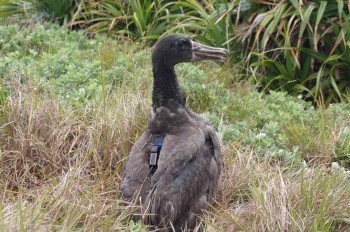Tomohiro Deguchi (Division of Avian Conservation, Yamashina Institute for Ornithology, Japan) and colleagues have published in the Journal of Wildlife Management on the deleterious effects of handling Short-tailed Albatross Phoebastria albatrus chicks.
The paper’s abstract follows:
“Capture and handling are essential methods for many studies of wild animals but can induce several harmful effects on individuals being studied. The relationship between physiological and behavioral responses in individuals exposed to these effects is not well known. We measured the blood level of muscle enzymes, aspartate aminotrasnsferase (AST) and creatine kinase (CK), indicating muscle damage in hand-reared short-tailed albatross (Phoebastoria albatrus) chicks before and after prolonged restraint for transmitter attachment beyond the usual feeding. We analyzed the relationships between enzyme levels and albatross pre- and post-fledging behaviors. Prolonged restraint for transmitter attachment elevated the blood levels of AST and CK in chicks. In chicks with higher levels of these enzymes, fledging date was earlier and the period to sustained flight after fledging was longer. These results indicated that prolonged handling for transmitter attachment on pre-fledging albatross chicks caused moderate muscle damage and behavioral changes before and after fledging. Although immediate post-fledging survival (the first 2 weeks at sea) did not appear to be affected, whether longer-term survival may be influenced is unknown. Reducing handling time for albatross chicks is important to reduce muscle damage and behavioral consequences.”


A Short-tailed Albatross chick gets a satellite transmitter
Photographs by Tomohiro Deguchi
With thanks to Tomohiro Deguchi for information and photographs.
Reference:
Deguchi, T., Suryan, R.M. & Ozaki, K. 2014. Muscle damage and behavioral consequences from prolonged handling of albatross chicks for transmitter attachment. Journal of Wildlife Management DOI: 10.1002/jwmg.765.
John Cooper, ACAP Information Officer, 30 August 2014

 English
English  Français
Français  Español
Español